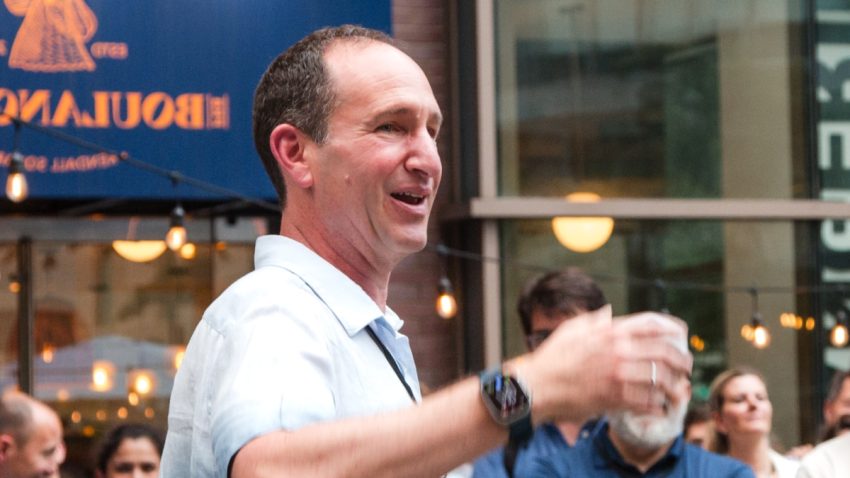Before emigrating to the U.S. and becoming a venture capitalist, David Frankel played a pivotal role in building South Africa’s Internet service provider industry — and fought to keep it out of Telkom’s monopolistic grip.
Frankel was one of five friends who started The Internet Solution, a company credited with commercialising Internet access in South Africa and helping to make the web more widely available.
Born and raised in Johannesburg, his paternal great-grandfather, Jacob Frankel, emigrated from Germany to South Africa in 1915 and founded Tiger Oatery, a small milling company, in 1920.
His grandfather, Rudolph Leo Frankel, led the company as it expanded to become Tiger Brands, a packaged goods conglomerate that makes South African favourites like Jungle Oats, All Gold, and Mrs Ball’s Chutney.
Frankel attended King David High School, where he met his friend and future business partner, Alon Apteker. As teenagers, he and Apteker sold CDs and picture frames at a Johannesburg flea market.
After school, Frankel was admitted to the University of the Witwatersrand and graduated with a BSc in Electrical Engineering in 1992.
In 1993, Apteker’s brother Ronnie launched The Internet Solution with university friends Thomas McWalter and Philip Green. It would later rebrand to simply Internet Solutions.
As Apteker tells it, his brother had bankrupted the company fairly quickly and asked him to invest some of his savings into the business. “Leading up to that, I just saw this intensity of Ronnie,” he said.
“He kept feeding me articles, and there was a point where he showed me a mainstream article — Time Magazine, I think — and that was when I understood what Ronnie was doing was part of a momentous shift.”
Apteker and Frankel joined Internet Solutions shortly after and helped establish one of South Africa’s first commercial Internet service providers just as the World Wide Web was taking off.
Taking on Goliath
Their success came quickly. In 1995, Dimension Data acquired 25% of Internet Solutions. Two years later, it bought the remaining 75% for R400 million.
Following the acquisition, Frankel served as Dimension Data’s e-commerce executive director and later joined the company’s board of directors.
On 6 June 1996, Internet Solutions helped establish the Internet Service Providers’ Association of South Africa (Ispa) with Frankel as co-chair.
Ispa was founded to combat the threat posed by Telkom’s entry into the Internet service provider (ISP) market as the sole provider of public switched telephony infrastructure in South Africa.
Independent ISPs accused Telkom of anticompetitive practices, alleging that it was abusing its position as South Africa’s telecommunications infrastructure monopoly to undercut their prices.
ISPs said they had to bear the expense of leasing Telkom lines for clients, whereas Telkom does not have to carry that additional expense in offering ISP services.
Less than a year after Ispa’s original complaint, Telkom hit back at the fledgling ISP industry by trying to monopolise the market entirely.
Telkom said its state-sanctioned monopoly over voice services should extend to the Internet. It argued that allowing private companies to offer Internet services would undermine its ability to supply access to underserved communities.
It claimed that it relied on the opportunity to cross-subsidise its services to roll out basic telecommunications infrastructure to currently under-serviced areas.
This sent shockwaves through the commercial Internet service provider industry, which feared being pushed out of business entirely.
Ispa brought the issue before the former sector regulator, the South African Telecommunications Regulatory Authority (Satra).
It disputed Telkom’s argument and told Satra that the company would actually be under no obligation to roll out universal Internet access, despite its claims.
It also said Telkom has consistently sought to characterise Ispa-aligned ISPs as purely self-serving commercial entities and conveniently ignored member projects in disadvantaged areas.
Victory and Harvard MBA
In October 1997, Satra ruled in favour of Ispa and found that Telkom’s monopoly on fixed-line telecommunications did not extend to the Internet Protocol.
“The industry cannot stand by and watch the gap between information haves and have-nots increase,” Frankel said as Ispa co-chair at the time.
“Ispa believes no organisation in South Africa can shrug off its social responsibility. The time for politicking has passed and all organisations in this sector need to understand their social responsibility.”
Telkom immediately challenged the ruling in court, but regulatory and market developments ultimately rendered the issue moot.
Among these was that Telkom’s monopoly on telecommunications in South Africa would officially end in 2002 as part of government’s “managed liberalisation” programme.
Predictably, government bungled this, and no competitor to Telkom launched in 2002. The true liberalisation of the sector only began years later with the Electronic Communications Act of 2005.
However, Frankel would leave South Africa before this next major shift in the industry to embark on an MBA programme at Harvard Business School in 2001.
He had deferred his admission to Harvard twice since 1993 and decided to finally continue his studies, graduating in 2003.
After completing his MBA, he funded eight companies founded by his classmates, including Eric Paley and Micah Rosenbloom’s Brontes.
“I thought I’d do another startup after business school, but I got involved with enough really amazing entrepreneurs,” Frankel said in an interview for a Harvard Business School profile.
In 2008, Frankel partnered with Paley and other entrepreneurs to form Founder Collective, a seed-stage venture capital fund with offices in New York City and Cambridge.
Under Frankel’s guidance, Founder Collective invested in numerous successful companies, including Uber, TheTradeDesk, SeatGeek, and BuzzFeed.
He has received numerous awards for his excellent business and investing achievements, including IT Executive of the Year from the Computer Society of South Africa.
He made the Midas List six times. In 2024, he appeared fifteenth on the Midas List of the world’s best venture capital investors and ranked second on the list of seed investors.
